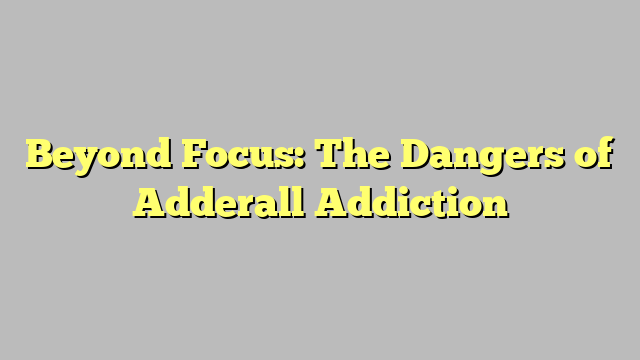Many individuals turn to Adderall to enhance focus, improve productivity, or combat conditions such as ADHD. While this prescription stimulant can provide temporary benefits in these areas, there is a stark reality that often goes unnoticed—the potential for Adderall addiction. This issue transcends the realm of mere dependency; it poses serious risks to one’s physical health, mental well-being, and overall quality of life.
Adderall addiction can creep insidiously into one’s daily routine, gradually altering behavior, thought patterns, and even relationships. What may begin as an innocent attempt to stay alert during long study sessions or demanding work hours can quickly spiral into a compulsive reliance on this drug. As tolerance builds and the initial effects wane, the temptation to increase dosage or frequency becomes a dangerous trap, leading many down a destructive path of addiction and dependence.
The Impact of Adderall Addiction
Adderall Addiction
Adderall addiction can have devastating effects on an individual’s physical health. Prolonged use of this stimulant can lead to increased heart rate, high blood pressure, and even heart attacks. Users may also experience extreme weight loss, insomnia, and a weakened immune system due to the drug’s impact on the body.
In addition to the physical toll, Adderall addiction can also severely affect a person’s mental well-being. Users may become dependent on the drug to function in daily life, leading to feelings of anxiety, agitation, and paranoia. Long-term use can also result in cognitive impairments, such as difficulty concentrating, memory problems, and mood swings.
Beyond the individual, Adderall addiction can strain relationships with friends and family members. The behavioral changes associated with addiction, such as mood swings and irritability, can create conflicts and isolation. Loved ones may feel helpless and frustrated as they witness the person’s decline while struggling to offer support.
Warning Signs and Risks
Adderall addiction can start innocently enough, with individuals taking the medication as prescribed for conditions like ADHD. However, there are certain warning signs that may indicate the development of an addiction. Some common signs include increased tolerance to the drug, withdrawal symptoms when not using Adderall, and an inability to cut down or control its use.
Aside from the physical signs, there are also risks associated with Adderall addiction that can impact various aspects of a person’s life. These risks may include academic or work-related problems, strained relationships with loved ones, financial difficulties due to spending excessive amounts on the drug, and overall decline in mental and physical health.
Recognizing these warning signs and acknowledging the potential risks of Adderall addiction is crucial in addressing the issue effectively. Seeking help from healthcare professionals, support groups, or addiction treatment centers can provide the necessary assistance for individuals struggling with Adderall dependence.
Seeking Help and Recovery
Adderall addiction is a serious issue that requires professional support and guidance to overcome. If you or someone you know is struggling with Adderall addiction, it is essential to reach out for help. Seeking assistance from a qualified healthcare provider or addiction specialist is the first step towards recovery.
Recovery from Adderall addiction is a journey that requires commitment and perseverance. In addition to seeking professional help, building a strong support system can greatly aid in the recovery process. Surrounding yourself with understanding and supportive individuals can provide the encouragement needed to make positive changes and move towards a life free from Adderall dependence.
Remember, recovery is a personal process, and it is essential to be patient and kind to yourself throughout the journey. Celebrate small victories along the way and stay focused on the ultimate goal of overcoming Adderall addiction. With determination, support, and the right resources, recovery is possible.

